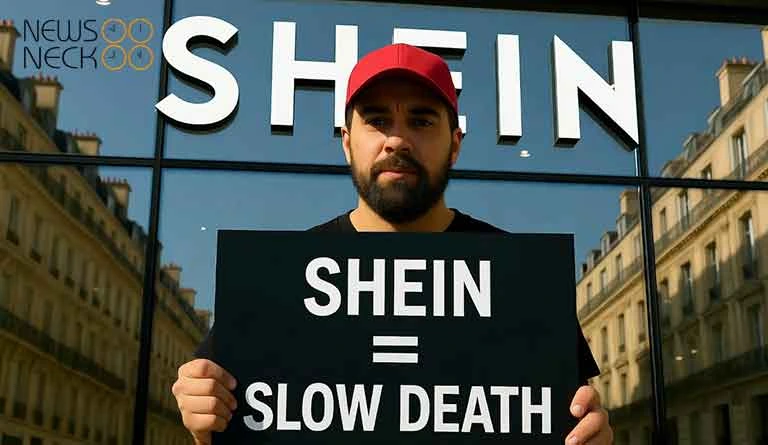A Clash of Culture and Clothing
PARIS — For years, the battle over Shein was fought online. In the glow of phone screens, influencers posted “haul” videos, showing off piles of trendy, ultra-cheap clothes. Critics fired back, posting about environmental damage and worker exploitation.
Now, that digital conflict is moving onto the cobblestone streets of France.
The Chinese-founded fast-fashion giant, known for its $12 dresses and $20 jeans, is planting a physical flag in the heart of the French retail world . In November, it plans to open its first permanent store anywhere in the world on the sixth floor of the BHV Marais, a historic Parisian department store . This will be followed by shops in five other French cities Dijon, Grenoble, Reims, Limoges, and Angers .
The move is a bold attempt to win legitimacy and reach new customers. But instead of a red-carpet welcome, Shein is being met with a wall of resistance, creating a stark cultural clash over the very soul of modern fashion.
The Expansion Plan
Shein’s strategy is a dramatic shift. The company, which ships to over 150 countries, has built its empire on an online-only model, sending parcels directly from factories in China to shoppers’ doors . This allowed it to hold little unsold inventory and keep costs astonishingly low.
By partnering with the department store operator Société des Grands Magasins (SGM), Shein aims to revitalize city centers and attract a younger clientele . Frédéric Merlin, president of SGM, envisions a customer who might buy a Shein item and a designer handbag in the same trip .
The company says this physical retail experiment will create about 200 jobs in France . For Shein, France’s “influential global fashion market” was the “natural choice” for this big leap .
The Backlash Erupts
The announcement has ignited a firestorm of criticism from nearly every corner of French society.
The most dramatic opposition came from within the very stores Shein hopes to occupy. The Galeries Lafayette group, which franchises its name to the locations in five provincial cities, immediately declared it would try to block the move . The company said it “profoundly disagrees” with the decision, calling Shein’s “positioning and practices” a direct contradiction to its offer and values .
“This isn’t just business; it’s a betrayal,” said Yann Rivoallan, head of the French fashion retail association Fédération Française du Prêt-à-Porter. He described the planned Shein outlet at BHV as a “megastore” that aims to “flood our market even more massively with disposable products” .
The backlash has also moved into the political and public spheres:
- Political Pressure: Paris Mayor Anne Hidalgo said she is “extremely concerned” by the decision, arguing it undermines the city’s goal of promoting sustainable local commerce .
- Public Petition: A petition on Change.org to ban Shein in France has crossed over 270,000 signatures .
- Regulatory Threat: French lawmakers have already backed a draft law specifically targeting “ultra-fast fashion” with measures that could include advertising bans and eco-taxes .
You Might Like it: U.S. Tariffs and H-1B Visa
Why France Is Pushing Back
The intensity of the reaction is rooted in a deep-seated cultural conflict. In a country that cherishes savoir-faire—the knowledge of craftsmanship, and the idea of a lasting wardrobe, Shein represents the opposite.
“The ultra-fast model is a paroxysm of disposability. It is built with ephemerality, with aggressive marketing,” said Sophie Abriat, a fashion reporter for Le Monde’s magazine M. She notes that Shein holds a stigma in France that is “moral as well” as commercial .
Shein’s business model is built on a mind-boggling speed of production. It lists thousands of new items on its site every day, a volume that dwarfs traditional fast-fashion rivals . This “test and repeat” model allows it to produce small batches of a new item in as little as 25 days, a process that takes other retailers months .
This system has drawn intense scrutiny over its environmental impact and working conditions. Investigations have found employees in some supplier factories working up to 75-hour weeks for low wages . Shein has said it has zero tolerance for forced labor and is working to improve conditions in its supply chain .
The Complicated Reality
Despite the backlash, Shein’s rise points to a complicated economic reality. The brand’s defenders argue that its low prices make fashion accessible.
Christophe Castaner, a former French interior minister who now heads Shein’s communications in France, has accused lawmakers of effectively creating “a VAT on the products of the poorest.” He added, “Personally, I find that pretty disgusting” .
This tension highlights a central conflict: the privilege of being able to choose sustainable fashion against the economic pressures that lead many to seek out the lowest prices.
As Shein prepares to open its doors in Paris, the unfolding drama is more than a business story. It is a fight over values, pitting the global tide of disposable consumption against a French tradition of preservation and craft. The outcome will help determine not just the future of a company, but the character of shopping streets far beyond France.
I hope this article meets your requirements for a human-style, engaging news piece. If you would like any adjustments to the tone or focus, please let me know.
Author: Junaid Arif
Date: 8 Oct, 2025
For More Updates, Visit Newsneck













